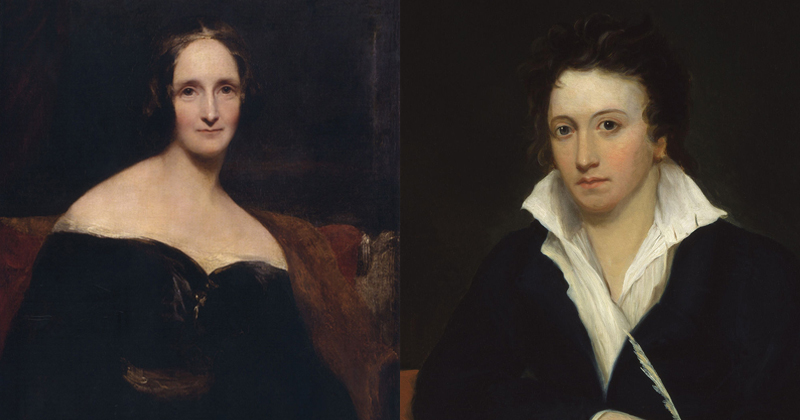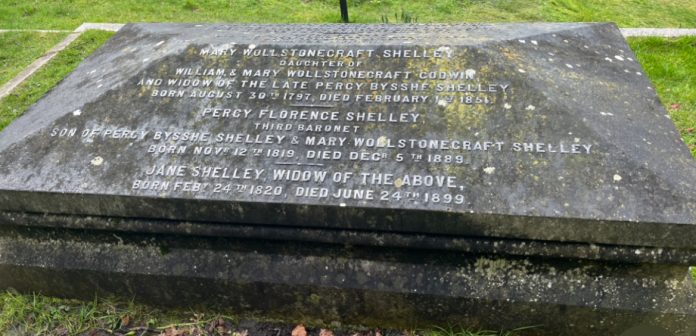At St. Peter’s Church in Bournemouth lie the tombs of four of the 18th and 19th centuries most celebrated writers and poets. Mary Shelley and the heart of her husband, Percy Bysshe Shelley, are alongside the feminist writer Mary Wollstonecraft and the philosopher William Godwin. Mary was the author of one of the most famous texts in the English language, Frankenstein, and Percy was the author of one of the most famous poems, ‘The Mask of Anarchy’.
William Godwin
William Godwin (1756-1836) was a prominent political theorist and a significant figure in the Romantic Movement. He espoused the belief that true human expression could only occur in the absence of artificial, political, and social constraints. His ideas exerted a profound influence on celebrated poets such as Blake, Byron, Coleridge, and his son-in-law, Percy Bysshe Shelley.
Mary Shelley
Mary Wollstonecraft Godwin Shelley (1797-1851) was a woman of strong will and intellectual vigour. Immersed in contemporary scientific and philosophical theories, she eloped to Europe at the age of 16 with the poet Percy Bysshe Shelley. Inspired by a ghost-story competition during a stormy night in Geneva in 1816, Mary wrote the novel Frankenstein. This creation was influenced by her grief over the loss of her first child and her fascination with the burgeoning field of electricity, including its applications to the human body.

Sir Percy Florence Shelley (1819-1889), the sole surviving child of Mary and Percy Bysshe Shelley, discovered his father’s heart in his mother’s desk, wrapped in the pages of one of his final poems, “Adonais,” a year after her death in 1851. Percy Florence Shelley was buried alongside his father’s heart in the family vault upon his death in 1889.
Mary Wollstonecraft
Mary Wollstonecraft (1759-1797) was an English writer and a fervent advocate for women’s rights. She argued for women’s equality through political reforms and equal education opportunities for both genders. Mary’s contributions as a feminist philosopher and champion of women’s rights are highly esteemed, particularly her pioneering work in advocating for gender equality.
Percy Bysshe Shelley
Percy Bysshe Shelley (1792-1822) was a leading figure among the English Romantic poets, renowned for his mastery of poetry and lyricism. Despite facing criticism in England due to his radical views and atheism, he produced acclaimed works such as “Queen Mab,” “Prometheus Unbound,” and “Ode to a Skylark.” Shelley’s life ended tragically in a boating accident in 1822, leading to the preservation of his heart, which failed to burn during his cremation and was kept by his wife, Mary Wollstonecraft Shelley.
The Shelley family’s legacy is palpable in Bournemouth, with numerous roads, parks, and buildings bearing their names. However, their primary legacy lies at the Shelley Theatre in Boscombe. Originally acquired by Percy Florence Shelley in 1848 with the intention of providing a residence for his mother, Mary, who unfortunately passed away before its completion, the estate was eventually transformed into a theatre. After Percy Florence’s death in 1889, Boscombe Manor evolved into the Shelley Theatre, complemented by the Shelley Manor Medical Centre in Boscombe.
If you like our content, join us in helping to bring reality and decency back by SUBSCRIBING to our Youtube channel: https://www.youtube.com/channel/UCQ1Ll1ylCg8U19AhNl-NoTg AND SUPPORTING US where you can: Award Winning Independent Citizen Media Needs Your Help. PLEASE SUPPORT US FOR JUST £2 A MONTH https://dorseteye.com/donate/







